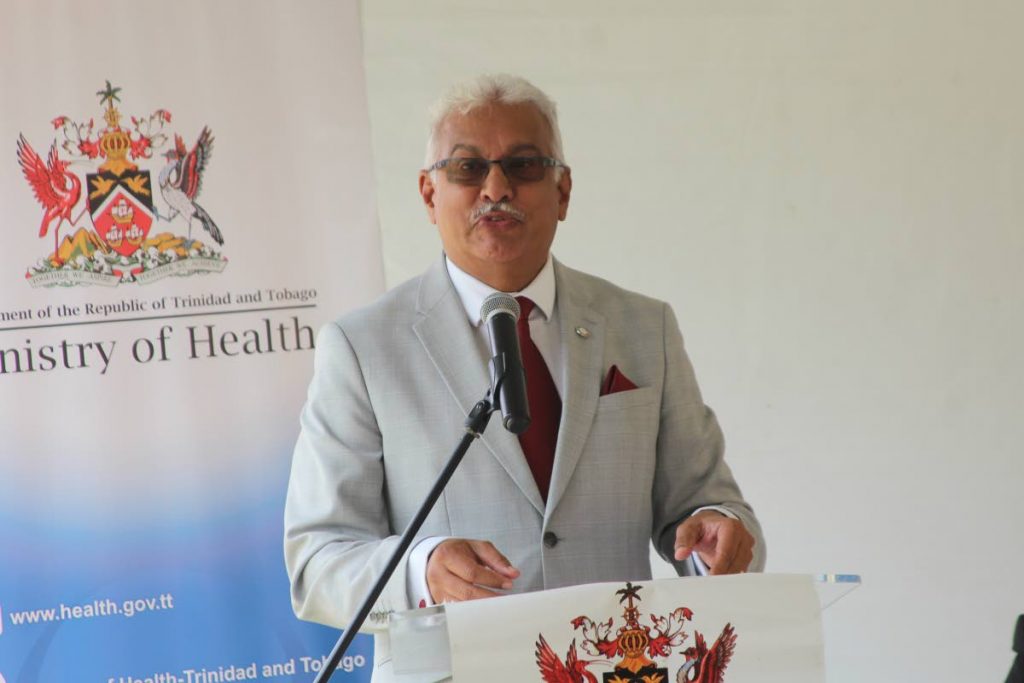Deyalsingh pushes warning button on measles

IT is only a matter of time that TT could get a pocket of people infected with measles because of the heavy flow of human traffic by both air and water to the Caribbean and Latin America.
This was the view of Health Minister Terrence Deyalsingh at a news conference at his ministry’s Park Street, Port of Spain office on Friday.
He said measles was eliminated in the Caribbean in 1992, but there has been a rise in figures over the past couple of years. He said Venezuela and Brazil had lost their elimination status because of the rising figures. The last measles-related death in TT was in the late 1980s.
TT's measle coverage data shows that this country has been able to keep the disease at bay, but that could now be changed becuase of vaccination hesitancy. Deyalsingh said reasons for vaccination hesitancy could be the success of the vaccination which gave people a false sense of immunity, religious beliefs, people's principles and myths about after effects of the vaccine.
He said St George central and St Patrick were two counties where there was an increased rate of vaccination hesitancy.
Deyalsingh said while he was not pushing the panic button, he was pushing the warning button.
Dr Eldonna Boisson, advisor, disease surveillance and epidemiology at the Pan American Health Organisation/World Health Organisation (PAHO/WHO) said, before the introduction of the measles vaccine in 1963, globally the measles virus resulted in an estimated 30 million cases and more than 2.5 million deaths each year. During 2000-2017, measles vaccination prevented an estimated 21 million deaths globally with an 80 per cent drop in measles.
Chief medical officer Dr Roshan Parasram said measles was an old disease of the world which was now becoming a re-emerging disease, and has been so in Europe and the United States in recent times because of the lack of the uptake of the vaccination for measles.
For TT, the first vaccination at one year stands at 90 per cent and the second vaccine stands at 92 per cent. PAHO/WHO targets 95 per cent coverage. He said these figures could be better as it did not include vaccines done by the private sector.
Parasram said there were 120,000 measles vaccines available, even to include the influx of Venezuelan migrants.
Executive director at the Caribbean Public Health Agency Dr James Hospedales said in 2016-2017 there was little or no measles on the radar screen, but in the last year there was a flag of cases being imported.
He said the Caribbean and Latin America saw millions of travellers every year from Europe and the US, and with that degree of travel and mixture of different parts of the world, contagious diseases transmissions were increased.
He advised parents if their children have not been vaccinated to do now as measles was "risky business.”
"It is only a matter of time before we have some secondary transmission because there are too many gaps where, in some cases, coverage is less than 60-70 per cent and measles needs no more foothold than that. It will spread."
Hospedales said hotel and tourism workers were in the frontline and, while some European countries do not require that information for their staff segue the cruise line situation, had the cruise line industry required that, then the situation could have been avoided.
He was referring to the US cruise ship the Freewinds, which was placed in quarantine recently after a confirmed case of measles was reported with a female employee being infected.
Measles is highly contagious serious disease and is spread by coughing, sneezing or direct contact. It usually starts with a high fever about ten to 12 days after exposure. A rash appears a couple of days after the fever. People who are infectious can spread it from four days before the rash appears, and up to four days after it has appeared.
Measles can result in death in up to 30 per cent of those infected with it. Most measles-related deaths were caused by complications associated with the disease
The most serious complications include blindness, encephalitis, sever diarrhoea and dehydration, ear infections, or severe respiratory infections such as pneumonia. Serious complications were more common in children under five and adults over 30.


Comments
"Deyalsingh pushes warning button on measles"